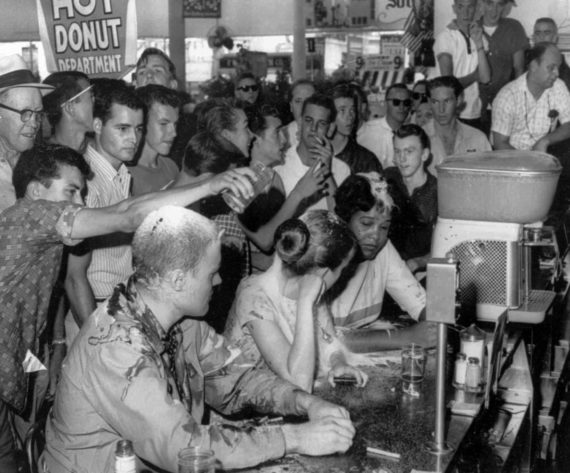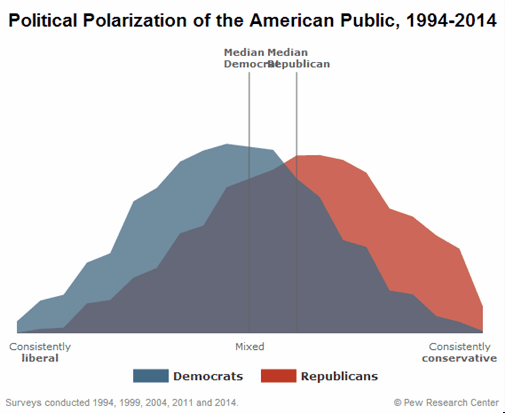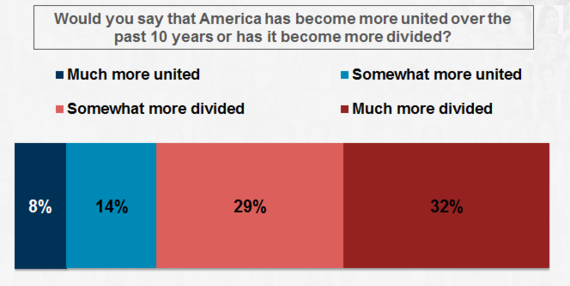I remember when I was young, something like 8 to 10 years old, I would regularly hear Rush Limbaugh’s angry, brassy voice coming from my home radio.
And there would always be another voice added to the mix: my mom’s, cursing him out and frustratingly getting angry at the air for allowing his voice to vibrate into her world. And then, almost invisibly she stopped, and started listening more and more to the calming sounds of NPR and the like.
As I got older, about a few years ago, I asked my mom about this. Why on earth did she listen to a man who just pissed her off? What did she gain?
She waved her hand as if waving away a mosquito and smiled: “Oh, I don’t know even know.”
That moment sticks with me, because in it I saw a woman who had matured. It seems to me that she simply realized that she was giving in to her lower self, her less evolved soul, whenever she listened to Rush. He had an ability to bring out the worst, both in his lovers and his haters. And that was, of course, why he was so popular.
Rush is still around, but there are many that have taken his place as the anger-stokers. And there were, of course, always anger-stokers before him. The ones who felt and feel that shaming, ridicule, and intolerant close-mindedness is a virtue, and who try to instill it in their supposed allies.
The difference is that today’s anger-stokers have the ability to spread their message far and wide. Not only that, the world of social media has given their audience the ability to be their own form of pundit, yelling, shaming, and insulting whoever their leaders have chosen is worthy of derision on this day or time.
I’ve been thinking a lot about this since the abortion clinic shooting. There are still very few actual facts about this man, but it seems that he probably was more of a nutball than anything, and maybe wasn’t actually originally trying for the abortion clinic in the first place. Then again, maybe he was, and his yelling “baby parts!” wasn’t an insignificant fact.
It bothered me because just days earlier, I had read an article by Matt Walsh, a well-known right-wing blogger turned pundit, in which he called on Christians to stop being so tolerant (turning the other cheek and such) and start embracing what he saw as the “progressives’” strategy of being intolerant in a post called “Dear Christians, Now Is The Time For Intolerance”.
My worries started earlier, before the shootings. I’ve watched in an increased shocked sadness as someone who I used to admire for being able to find a balanced and empathetic approach with his conservative views on life has found a tone that has become more and more like Rush’s.
And I watched recently as more and more, especially after the now-debunked abortion videos came out, that his tone turned from mere pundit to true hate-monger. Calling people who work at Planned Parenthood murderers, parents who do abortion murderers, equating abortion to genocide.
And then, finally, his “intolerance” post reached the surface. In that moment, I saw just how far rhetoric can go when hate becomes the way it’s communicated.
This to me is a tragedy. A tragedy of leadership. Where, it seems, not only are we turning in more and more to the angry voices of the world, but we have allowed ourselves to become those voices as well.
The “funny” thing is that I am against abortion. But I’ve never written about it. For many reasons: it’s such a nuanced issue and I don’t believe an all-or-nothing debate will ever be fruitful nor moral or that it is a real worry about how women who want to handle abortions in the future will handle them if it is made illegal, for example.
But there is one more reason that I haven’t been able to find the words, one far more personal than any logical reason: the women I know who have had abortions.
From friends to friends who write about it publicly, it is clear to me that no one who has an abortion is doing so out of some sort of malicious intent. Quite the opposite: the choice is painful and extremely personal.
And so anyone writing about abortion, I feel, needs to write from a place of extreme empathy, a place of understanding, a place of caring. And maybe they shouldn’t write at all until (or if) they find the right words.
And those who are pro-choice aren’t evil, of course. They believe they are doing the right thing. To cast them as evil, as genocidal maniacs, is either ignorant (unable to see the difference between actions and intentions) or simply malicious.
Either way, the result is the same: hate and demonization of good people. A general dissolving of the connections between those with different beliefs. And an atmosphere of anger and hate that is increasingly pervading our country and world.
None of these are good or healthy things. None of them will solve problems, persuade anyone to agree, or create truly meaningful movements. Instead, they will simply infect those already inclined to anger on one side and perhaps influence others on the same political spectrum to follow the same strategy, God forbid.
This is not to say that Matt Walsh caused or in any way contributed to the shooter’s actions. But his lack of empathy certainly did not help a nation that should have been grieving instead of fighting.
I see this in my own world as well. As an orthodox Jew, I strongly believe we need to stand up for what’s right. And that has translated especially into my love for Israel, where I see, left and right, attacks on it from the media, from the public, on college campuses, and, increasingly, from political leaders.
This dismays me to no end.
But it dismays me even more when, as time goes on, and the situation in Israel worsens, those who are (seemingly) fighting for it, are using the rhetoric of hate and anger.
I’ll never forget an article I read by Shmuley Boteach that argued for essentially the same attitude Matt Walsh has argued for in the abortion fight: that of complete demonization of the “enemy”.
What I found fascinating was his argument that this strategy, one he specifically framed in the word “shaming”, was the same as Martin Luther King Jr. during the civil rights movement. He argued that marching on Selma, sit-ins, and other such strategies were no different than his call to shame and unabashedly attack anti-Israel activists.
There is simply no comparison between the two. One is a brave, assertive, strong stand for what’s right. One that wasn’t focusing on demonizing but on revealing the injustice of the “other side” through action that led solidarity with those who were oppressed and those who allied with them.
The other tactic, what has become widely known as the “shaming culture” of our generation is the exact opposite. It is cowardly, in that its main goal is not change but stoking the flames of people’s worst passions. It is morally malignant, in that it demonizes on a personal level, those who believe they are doing the right thing. And it is divisive in the worst way, in that it simply turns the discussion from “what’s right” to “us vs them”.
Ironically, I believe that Boteach inadvertently revealed what the real secret to fighting for a just cause is.
In the analogy he presented, I’d argue his tactics, and those of other anger-stoking pundits, from conservatives like Matt Walsh and Rush Limbaugh to liberals like Mondoweiss and Michael Moore, are closer aligned to the Black Panthers than the civil rights movement.
The difference is simply this: empathy and personal strength.
When Matt Walsh describes Planned Parenthood and those who receive abortions as murderers, his lack of empathy for those he disagrees with is laid bare in painful exposure.
This was revealed perfectly in Walsh’s reaction to the attack on abortion clinic. Rather than expressing sympathy for the victims, he instead equated him with Planned Parenthood:
Interesting fact: Planned Parenthood kills 100 times more people in a day than alleged "anti abortion extremists" have killed in 40 years.
— Matt Walsh (@MattWalshBlog) November 29, 2015
In other words, to him, a mass murderer is quite literally no different than an abortion provider.
Only an anger-stoker could possibly come to such a conclusion. One that is so lacking in empathy for the “other side” that it is almost impossible to comprehend.
This strategy is not equatable to the civil rights movement. It is far more analogous to hate groups.
And that is where Boteach’s using the civil rights movement is so beautifully, perfectly useful. One of the most famous pictures of the time was of black activists being covered in food as they calmly sat together at a sit-in at an all-white restaurant. If you look carefully, you’ll see a white man sitting in solidarity with them, food all over him as well:

Why is this powerful? Because it isn’t about shaming (although it’s clear there is one side interested in shaming). It’s about standing up for what’s right and letting the demons that exist within others to come out naturally. It also promotes true solidarity, one that resulted in all those whites who secretly (or not so secretly) stood with them to finally start to speak up rather than accept the status quo.
In this, we see both the empathy and personal strength necessary to create a true movement. Empathy because it does not assume everyone who has allowed the status quo to exist for so long is inherently evil. And personal strength because instead of getting up and yelling with voices of hate, they sat in absolute silence and were able to change the nation. Just like Rosa Parks. Just like so many other brave souls.
Which isn’t to say we shouldn’t speak, God forbid. Martin Luther King Jr was one of the most eloquent speakers in the world, but his was a voice of strength and a moral compass that never wavered, not one of hate and demonization.
What’s become ever-scarier about the growth of the hate-pundits and their minions is that thanks to the rise of social media and other technology that allows hate to feed upon itself and spread exponentially, this rhetoric has spread much further than it ever did when Rush was just considered some kook on the radio with a small, marginalized (but loud) following.
We can see it almost everywhere today. We can see it in the recent explosion of college campus divisions, where faculty members claim that free speech is more important than even listening to the students it is their express job to aid in creating a feeling of student safety, and the students themselves who are increasingly focusing inwards rather than outwards (I wish I could write more about this myself but people so much better than myself already have).
Even scientists are arguing that their profession is not “militantly atheist” enough to do their work “correctly”.
And the trend has gotten as high up as our own president, one who came into office specifically claiming his goal was to heal the divisions between parties, and who, it seems, has in his final two years of office has made it patently clear that he’s either given up on that, or that he never really cared in the first place.
Not that the Republicans are any better: it is absolutely horrifying to see the political equivalent of Rush Limbaugh, Donald Trump, continue to gain steam in the primary polls. Not horrifying because it necessarily means he will be president (oy) but that our country has become so embracing of such shaming speech that a sizable bloc are willing to vote for one whose entire platform is built upon it.
To give you an idea of how much things have changed and how quickly, this same man was considered even in his own party as a joke candidate only four years ago, when he last tried to run.
What’s changed since then? Shaming, hate-mongering, and division have become more and more accepted in our nation, while empathy and personal strength are now seen as weaknesses (when, of course, the opposite is true).
And one only need read the latest polls (and see some of the graphs I’ll share below), to see just how divided we’ve become:


I’d like to make one last thing clear: I am not saying we should accept evil. I am saying that most people we disagree with aren’t evil. The people who are pro-choice and pro-life are both by-and-large good people fighting for a cause they believe is incredibly important. The people who are “anti-Israel” and pro-Israel are by-and-large also good people fighting for what they believe is a just cause (no matter how misguided you may happen to think they are). The people on any political fence are good people.
And, ironically, it seems that often, we save our angry rhetoric not for the actual evil people, like the ones who just shot up hundreds in Paris, or ISIS itself, or terrorists in Israel or the ones actually inciting antisemitism on campus, but for those who are good. In an understandable way, it angers us more to see good people doing “bad” things.
But we cannot allow ourselves to be swayed by the rhetoric of hate and anger-mongering pundits. We must not allow ourselves to fall into the abyss of our most base emotions: those that demonize all who disagree with us, no matter how sensitive the issue.
What we must do is be discerning: to know who is truly evil, who is truly worth fighting, who is truly trying to cause pain and suffering in the world.
I think we’ll find that group is smaller than we imagine.
And for everyone else, we must show empathy. We most bring our personal strength to the fore. We must be internally brave and externally thoughtful and judicious in our words and actions.
Because what the pundits, hate-mongers, and other want us to think is this: those who disagree with you are bad people. And so whatever method of attacking them is then justified. The anger, the hate, the lack of empathy is all justified because those who disagree are simply in the way. In other words, the ends justify the means.
But what we must all learn, what we must all accept inside of ourselves is this: the means (how we speak, how we think, how we act) are the ends.

Leave a Reply